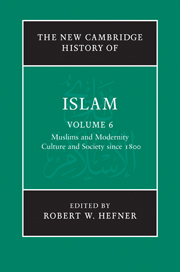Book contents
- Frontmatter
- 1 Introduction: Muslims and modernity: culture and society in an age of contest and plurality
- PART I SOCIAL TRANSFORMATIONS
- PART II RELIGION AND LAW
- PART III POLITICAL AND ECONOMIC THOUGHT
- PART IV CULTURES, ARTS AND LEARNING
- 20 Islamic knowledge and education in the modern age
- 21 History, heritage and modernity: cities in the Muslim world between destruction and reconstruction
- 22 Islamic philosophy and science
- 23 The press and publishing
- 24 The modern art of the Middle East
- 25 Cinema and television in the Arab world
- 26 Electronic media and new Muslim publics
- Glossary
- Bibliography
- Index
- References
23 - The press and publishing
from PART IV - CULTURES, ARTS AND LEARNING
Published online by Cambridge University Press: 28 March 2011
- Frontmatter
- 1 Introduction: Muslims and modernity: culture and society in an age of contest and plurality
- PART I SOCIAL TRANSFORMATIONS
- PART II RELIGION AND LAW
- PART III POLITICAL AND ECONOMIC THOUGHT
- PART IV CULTURES, ARTS AND LEARNING
- 20 Islamic knowledge and education in the modern age
- 21 History, heritage and modernity: cities in the Muslim world between destruction and reconstruction
- 22 Islamic philosophy and science
- 23 The press and publishing
- 24 The modern art of the Middle East
- 25 Cinema and television in the Arab world
- 26 Electronic media and new Muslim publics
- Glossary
- Bibliography
- Index
- References
Summary
One of the most intriguing changes affecting Muslim societies in modern times has been that in modes of communication. Once relying on oral means for all interpersonal activities, these societies have come to employ writing as a standard implement of social exchange and individual expression. By the mid-twentieth century, mass-produced written and printed messages had come to permeate public communication, supplementing, if not quite supplanting, the age-old oral modes. As ever, the changes evolved differentially in different parts of the Islamic world. But eventually they came to affect most people, relegating those unaffected to the margins of communal activity. The present chapter explores these developments, focusing largely on a medium whose history epitomised the process: the periodical press and its assimilation in Muslim countries, with emphasis on the Middle East.
A late debut
Back in 1800, communication throughout the Islamic world was for the most part spoken, not written. As in most non-European societies of the time – and in Europe itself earlier on – people had little use for written texts in conducting their daily affairs. Official announcements were delivered by mosque preachers and town criers, and news was told by those who brought it from afar, then circulated orally in the community. Pious masters imparted spiritual guidance orally to small or big gatherings of listeners. Education, on its lower level, relied on the spoken word and memorisation more often than on reading and writing. Entertainment was likewise obtained by listening to storytellers and other verbal performers.
- Type
- Chapter
- Information
- The New Cambridge History of Islam , pp. 572 - 596Publisher: Cambridge University PressPrint publication year: 2010
References
- 1
- Cited by

